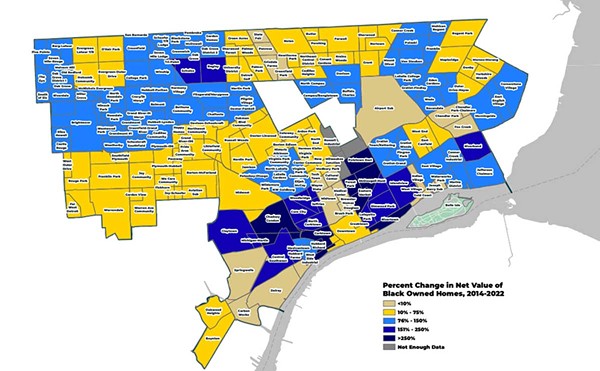It looks like Detroiters (or at least the 100,600 voters who bothered to show up at the polls) are satisfied with the status quo, having pretty much re-elected their mayor, city council members, and city clerk to office — with one exception. That exception was George Cushingberry, who was unseated during the primary, so this was no election day surprise that Roy McCallister Jr. took the District 2 seat.
With the resounding status quo vote, it would seem odd if Detroiters got any big surprises in the direction things are going right now. Even City Clerk Janice Winfrey, who was probably the most vulnerable candidate after mistakes in last year's election, managed to hold off Garlin Gilchrist. The Michigan Chronicle came in with a huge endorsement for Winfrey, splashing her picture on the front page to help push her over the top in her razor-thin 1,482-vote victory.
Not much drama there. Even though Mayor Mike Duggan's opponent, Coleman Young II, attempted to create some racial edginess in the run up to the election, it didn't get much traction. There are a lot of folks who might have agreed with Young, but they aren't the ones who got out and voted.
There is and will be more drama around the marijuana proposals. That drama started in August, when Citizens for Sensible Cannabis sued Winfrey because she wouldn't put petition initiative Proposals A and B on the ballot. She tried to do the same thing in 2012 on Proposal M to decriminalize marijuana in Detroit. Both in 2012 and this year, the courts told her that the proposals must go on the ballot, and each time the proposals won.
I usually discuss marijuana issues separately from city politics, but this week they are intricately entwined. The two proposals do a number of things, such as extend the hours provisioning centers may be open to 9 a.m. to 9 p.m. It shortens the distance such facilities have to be from schools, liquor stores, and other things to 500 feet, and eliminates the distance from parks and daycare centers. It opts in to the state system for medical marijuana businesses, thereby allowing production, processing, and testing facilities in Detroit. It also bypasses some city processes such as the Board of Zoning Appeals that have not been allowing variances for facilities that fall outside the strict zoning laws.
When I appeared with city attorney Butch Hollowell on a WDIV Channel 4 segment to explain the proposals, Hollowell told me the city was agnostic on the issues — meaning the city wasn't advocating any side on this issue.
The city may have been agnostic, but several city council members, prominent ministers, and both daily newspapers came out as pointedly against the proposals. Still they passed with sturdy majorities.
The drama lies in the proposals bypassing some authorities of the BZA. The Detroit zoning ordinances are very strict, and the only way to get a variance for something like being only 920 feet from a church instead of the required 1,000 feet is to go to the BZA. However, the anti-marijuana groups have been packing the room every time a provisioning center is scheduled to appeal its denial of a license. That won't work under the new laws.
However, the city may explore legal avenues to block the parts of the law that bypass procedures that city attorneys believe are its rightful areas of authority. Hollowell suggested that earlier, though demurring that the city would "cross that bridge" when it came to it.
Well, we're standing at that bridge, and if the city chooses to cross it there will be vociferous support from the "shut-em-down" forces. DeBorah Omokehinde, a former BZA member and primary force organizing the opposition to marijuana stores at the BZA hearings, has called a meeting on Thursday, Nov. 16, at Cobo Hall to marshal the forces.
"Any and EVERYONE needs to attend this meeting in OPPOSITION OF THIS EXPANSION OF MEDICAL MARIJUANA CENTERS IN OUR COMMUNITY," reads the email message that has been circulating since the proposals passed.
Proposals A and B are the backlash caused because the city council, egged on by an alarmist yet influential minority, went too far in attempting to zone provisioning centers out of sight and out of mind. A little more tolerance may have avoided having it taken out of their hands by voters.
That is truly the only palpable drama out of this election. Nobody is having community meetings to dispute Duggan's victory or Cushingberry's defeat. Detroit voters have resoundingly endorsed the stated course for the city.
There will be dramas to come — after all, this is Detroit. But that drama will not come from changes of demeanor from our elected leaders. All of the folks we voted in are well-known entities, and a zebra don't change its stripes once elected to office.
The mayor's major theme during the campaign was focusing the city's vision beyond downtown and Midtown. I welcome and applaud all that is being done. The big deal has been that Duggan has turned the lights on and shortened response time for emergency vehicles. Apparently bus service has improved, but the tourist train downtown gets way more attention.
"So, what have you done for me lately?" one might ask. Well, Duggan is touting initiatives in the Fitzgerald and West Village neighborhoods. I've been observing events in both areas. In West Village businesses seem to be developing at a rapid pace around the Van Dyke and Kercheval area. In Fitzgerald I don't think folks are ready to jump up and scream about things yet.
I'm a supporter of these initiatives, but at the same time when you weigh what is being done against what is needed, it can seem very daunting. Just look at the Fitzgerald initiative, which is bordered by Puritan, Wyoming, McNichols, and Livernois. That's not even the whole Fitzgerald neighborhood. Fitzgerald extends from McNichols to Fenkell. Look at a map of the Fitz Forward plan and it only includes the half-mile from McNichols to Puritan. I'm sure the folks on the south side of Puritan are wondering where their neighborhood revitalization is.
So we have a plan to save half a neighborhood. I'll take it, but I'm not fooling myself about what we're up against here. And I've got to say the only way to speed it up is for the folks inside the neighborhoods to make demands on the city and on themselves.
As I see it, the only way to make more than incremental progress on most of the neighborhood needs is for folks in the neighborhoods — from Restoring the Neighbor Back to the Hood, to Motor City Blight Busters, to community gardens, to the People's Platform, to the churches, to the mom and pop businesses — to keep at it. Each of them is a plank in a bridge that needs to be built across the city. And the more difference any of them makes creates a better place so that if and when the city does show up, you can be a community resource that people can rely on rather than depending only on what the city is willing to do for you.
To paraphrase an activist axiom: Think city; act on your block.






